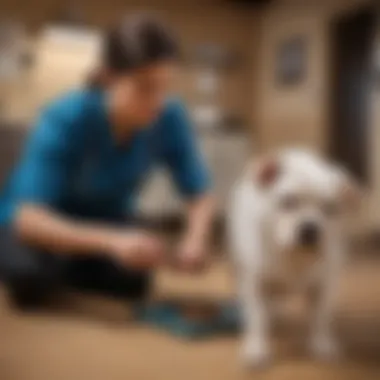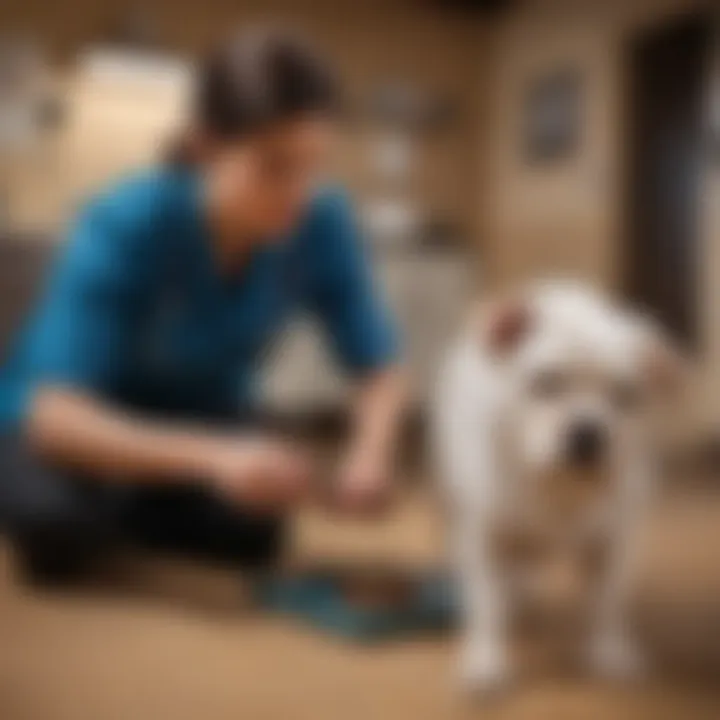Effective Strategies for Managing Pet Diarrhea


Intro
Managing diarrhea in pets can be a challenging task for any owner. Understanding the factors that contribute to this condition can make a significant difference in how it is approached. Whether it's the occasional upset stomach or a more severe case, knowledge and timely actions are crucial for the health of your pet.
Understanding Your Pet
Breed Traits
Different breeds exhibit varying health conditions. Certain breeds, for example, may be more prone to gastrointestinal issues. Being aware of these traits can prepare owners for potential problems. For instance, small breeds may experience stress-induced diarrhea more frequently than larger ones.
Common Temperaments
The temperament of a pet influences its overall health and psyche. An anxious animal might react poorly to change, which could lead to digestive disturbances. Owners should monitor their pets' behaviors, noting any changes that might correlate with episodes of diarrhea.
Special Needs
Some pets require special attention due to pre-existing conditions. These needs should always be factored into any dietary changes or treatment plans. Pets with chronic health issues may require specific diets or medications, making it vital to consult with professionals.
Pet Care Essentials
Nutrition and Feeding Guidelines
Proper nutrition is at the core of preventing and managing diarrhea. Always consider the following:
- High-quality, balanced diet tailored to the pet's age and health status.
- Gradual introduction of new foods to prevent digestive upset.
- Hydration plays a key role; ensure fresh water is always available.
Grooming Tips and Techniques
While grooming is often associated with aesthetics, it also impacts health. Regular grooming can reduce the risk of skin infections that might lead to diarrhea. Additionally, keeping the area clean where pets relieve themselves can minimize bacterial contamination.
Health and Wellness
Routine veterinary check-ups are essential. Preventive care, such as vaccinations and deworming, can significantly reduce the risk of diarrhea-related issues.
Training and Behavior
Basic Training Techniques
Basic training can reduce anxiety levels in pets. A well-trained pet is likely to experience less stress, which can be beneficial for their digestive health. Tools like positive reinforcement can be particularly effective.
Behavioral Problems and Solutions
Addressing behavioral issues, such as anxiety or aggression, takes time and patience. Some pets may benefit from calming aids or adjustments in their environment. Understanding their triggers can assist in mitigating stress and prevent episodes of diarrhea.
Mental Stimulation Activities
Engaging your pet in stimulating activities can relieve stress. Puzzle toys or training exercises not only provide mental workouts but also create a routine that can enhance overall well-being.
Engaging with Your Pet
Interactive Games and Toys
Choosing the right toys can greatly impact a pet's mental health. Toys that encourage physical activity can help reduce anxiety and promote a healthy digestive system.
Safe Outdoor Activities
Outdoor activities allow pets to exercise. Activities like walking or playing fetch can improve their physical condition. Just ensure that spaces are safe and free of contaminants that could contribute to digestive problems.
Family-Friendly Pet Interactions
Including family members in interactions strengthens the bond with pets. It lowers anxiety for both the animal and the owner and can help create a well-adjusted pet that is less likely to experience bouts of diarrhea.
Pet Adoption and Integration
Choosing the Right Pet for Your Lifestyle
Selecting a pet that aligns with lifestyle and home environment is critical. A mismatch can lead to increased stress for both the pet and its owners.
Preparing Your Home for a New Pet
Preparation includes setting up a safe environment and having proper supplies ready. This minimizes shock for the new pet and helps establish consistency—a factor that contributes to its health.


Tips for Smooth Prelims
Introducing a new pet to existing family members requires careful consideration. Gradual introductions can reduce territorial stress and help with smoother integration.
Finale
Managing diarrhea in pets involves a multifaceted approach. By understanding your pet's needs, prioritizing nutrition, and engaging in proper behavioral training, owners can significantly reduce the occurrences of diarrhea. Consultation with veterinary professionals remains vital in all instances. Knowledge and preparation can lead to healthier, happier pets.
Understanding Diarrhea in Pets
Managing diarrhea in pets requires a clear understanding of this common issue. Pets may experience diarrhea for a variety of reasons, and the context can impact how owners should respond. Recognizing the signs and being aware of the potential implications is crucial for prompt and effective treatment. This section delves into defining diarrhea and discussing the symptoms that pet owners should diligently monitor.
Definition of Diarrhea
Diarrhea in pets is usually characterized by an increase in the frequency, volume, and fluidity of bowel movements. This condition can be acute or chronic. Acute diarrhea can persist for a few days while chronic diarrhea refers to issues lasting for weeks. By definition, diarrhea can be attributed to the rapid passage of food through the gastrointestinal tract, leading to insufficient absorption of nutrients and water. Understanding this basic definition is essential, as it lays the groundwork for identifying potential causes and appropriate management strategies.
Common Symptoms to Look For
When monitoring a pet for diarrhea, it's crucial for owners to look for various symptoms beyond just loose stools. Common signs may include:
- Increased urgency to defecate
- Straining or signs of discomfort while attempting to defecate
- Changes in appetite, which can vary from eating less to not eating at all
- Signs of dehydration such as excessive thirst, dry gums, or lethargy
- Occasional vomiting or signs of abdominal pain
Identifying these symptoms early can help pet owners assess the severity of the situation and decide on the best course of action. Each symptom contributes to a larger understanding of the pet's health and can guide the owner in seeking appropriate veterinary care if essential.
Understanding the context and recognizing symptoms of diarrhea enables pet owners to act judiciously, reducing the risk of serious health complications.
Causes of Diarrhea in Pets
Understanding the causes of diarrhea in pets serves as a crucial element in managing this common ailment effectively. Recognizing the underlying factors can guide pet owners in taking appropriate action, whether it involves dietary changes, medical interventions, or adopting preventive measures. By addressing the causes, pet owners can enhance their animals' quality of life and reduce any potential complications that may arise from untreated diarrhea.
Dietary Issues
Dietary issues often play a significant role in causing diarrhea. Many pets may experience gastrointestinal distress due to sudden changes in their diet. For instance, switching from one brand of pet food to another without a gradual transition can upset their digestive system. Furthermore, certain human foods can also lead to digestive issues. Foods like chocolate, grapes, and onions are particularly harmful.
Additionally, some pets have allergies or intolerances to ingredients such as gluten or specific protein sources. This can result in an inflammatory response, leading to diarrhea. To mitigate these risks, pet owners should:
- Introduce new foods slowly: Begin with small amounts of the new food mixed with the old.
- Consult your vet: If you suspect food allergies, consider discussing elimination diets.
Infections and Parasites
Infections and parasites are other common causes of diarrhea in pets. Bacterial infections, viral infections, and parasitic infestations can all lead to significant gastrointestinal upset. For example, pathogens such as Salmonella or E.coli can be transmitted through contaminated food or water. Parasites like Giardia or roundworms can also wreak havoc on a pet's digestive system.
Pet owners should be aware of the symptoms of such infections, which can include:
- Frequent and watery stools
- Vomiting
- Lethargy
Routine veterinary check-ups can help identify infections early and ensure timely treatment. Maintaining good hygiene and proper sanitation can also significantly decrease the chances of infections.
Underlying Medical Conditions
Some pets may suffer from diarrhea due to underlying medical conditions unrelated to diet or infections. Conditions such as inflammatory bowel disease (IBD), pancreatitis, or liver disease can all manifest with diarrhea as a prominent symptom. Chronic diarrhea may indicate more than a temporary upset, and recognizing this can lead to better management of the pet's health.
Signs that may indicate an underlying condition include:
- Prolonged diarrhea
- Blood or mucus in the stools
- Weight loss
If a pet experiences these symptoms, it is essential to seek veterinary assistance promptly. A veterinarian can conduct diagnostic tests to determine the underlying cause and recommend an appropriate treatment plan.
Understanding the causes of diarrhea is essential for effective management and recovery. By identifying the root cause, pet owners can implement strategies that address not just the symptoms but also the underlying issues.
Immediate Steps to Take When Your Pet Has Diarrhea
When a pet experiences diarrhea, it can be concerning for any owner. Knowing what steps to take immediately can make a significant difference in your pet's recovery. It is essential to act quickly yet thoughtfully. You must evaluate the situation accurately, decide whether to withhold food, and ensure your pet stays hydrated. These initial actions can help control the condition and prevent further complications.
Assessing the Severity of the Situation
Before taking any specific actions, it is vital to assess how serious your pet's diarrhea is. Monitor the following factors:
- Frequency of bowel movements: Is your pet going frequently or only occasionally?
- Consistency of stool: Is the stool watery, or does it contain any unusual materials?
- General behavior: Is your pet acting normally, or are they showing signs of distress?
- Accompanying symptoms: Are there any additional symptoms like vomiting, lethargy, or fever?
Based on these observations, you can decide how to proceed. If diarrhea is mild and your pet seems normal otherwise, home remedies might suffice. However, if there are troubling signs, seeking veterinary assistance promptly is crucial.
Withholding Food: Pros and Cons


One commonly debated method during a diarrhea episode is withholding food. Here are some pros and cons of this approach:
Pros:
- Resting the digestive system: Allowing a break from eating can give the gut time to recover.
- Reducing irritation: Minimizing food intake might decrease gastrointestinal irritation, providing comfort.
Cons:
- Nutritional shortfalls: Not eating for extended periods can lead to nutrient deficiencies, especially in smaller pets.
- Loss of energy: Pets need fuel from food for energy, especially if diarrhea leads to lethargy.
If you decide to withhold food, do so for no longer than 12-24 hours, depending on the pet's size and age. Always consult your veterinarian if uncertain.
Hydration Considerations
Hydration is critical when a pet has diarrhea, as it can lead to dehydration. Watch for these signs of dehydration:
- Dry gums: Check for moistness in the mouth. Dry gums can be alarming.
- Skin elasticity: Lightly pinch the skin between the shoulder blades. If it does not return quickly, your pet may be dehydrated.
- Lethargy: Reduced activity levels can indicate low energy from lack of fluid intake.
Encourage your pet to drink water. If they refuse, offering an electrolyte solution like Pedialyte is an option. Always provide fresh water, and monitor your pet's intake closely. Ensuring proper hydration plays a vital role in the recovery process.
Remember: If your pet shows signs of severe dehydration, seek veterinary attention immediately.
Dietary Changes for Recovery
Dietary adjustments play a vital role in aiding recovery for pets suffering from diarrhea. Proper nutrition can help restore intestinal balance, provide necessary nutrients, and support overall health. When diarrhea occurs, the digestive system can become inflamed and sensitive. Therefore, specific dietary changes can mitigate discomfort and promote healing.
Bland Diet Recommendations
Introducing a bland diet is often recommended for pets recovering from diarrhea. Foods that are easy to digest help minimize irritation in the gastrointestinal tract. A common choice is boiled white rice mixed with lean protein sources such as boiled chicken or ground turkey.
Some other bland diet options include:
- Plain cottage cheese
- Mashed sweet potatoes
- Pumpkin (not the spiced pie filling)
These food items provide carbohydrates and proteins without overwhelming the digestion process. However, it is crucial to avoid any seasonings or additives that could irritate the gut further. It is best to serve small, frequent meals to help the pet gradually adapt.
Introducing Probiotics
Probiotics can be beneficial during the recovery from diarrhea. These live microorganisms promote a healthy gut flora, aiding digestion and improving gut health. Probiotics like Lactobacillus and Bifidobacterium are common in many pet formulations and can help restore the balance of bacteria in the intestines.
Before introducing probiotics, it's wise to consult with a veterinarian to choose the right product and dosage, as different pets may have various needs. Giving probiotics can speed up recovery and decrease the likelihood of future episodes.
Reintroducing Regular Diet
Once a pet shows signs of improvement, it's time to consider reintroducing their regular diet. This process should be gradual. Start with small amounts of the regular food mixed with the bland diet, slowly decreasing the bland food over several days.
Always monitor the pet for any adverse reactions during this transition. If diarrhea returns, it may indicate that the regular diet is not suitable yet. Returning to bland foods is an option until further recovery is made.
"Dietary changes can significantly impact the recovery trajectory for pets facing diarrhea. Always consider professional guidance when making those changes."
In summary, dietary changes are a fundamental aspect of managing diarrhea in pets. By implementing a bland diet, utilizing probiotics, and carefully reintroducing their normal food, pet owners can facilitate a more effective recovery process.
Home Remedies for Mild Cases
Home remedies serve as a first line of approach when managing mild cases of diarrhea in pets. They provide pet owners with practical solutions that are often easy to implement. While it is crucial to understand that home remedies do not replace veterinary care, they can help provide relief in less severe situations. Utilizing these remedies may alleviate symptoms and support the pet’s recovery process. However, it's always wise to proceed with caution and monitor ongoing conditions closely.
Natural Dietary Supplements
Natural dietary supplements can play a significant role in managing mild diarrhea in pets. Products like psyllium husk or pumpkin puree are well-known for their ability to firm up stool consistency. These remedies are rich in soluble fiber, which can help regulate bowel movements. A common approach is to introduce these supplements gradually into the pet's diet.
- Psyllium Husk: This supplement aids in absorbing excess water in the intestines and contributes towards moving food through the digestive tract more efficiently.
- Pumpkin Puree: Plain, canned pumpkin contains soluble fiber and has natural binding properties. It can easily be mixed with wet or dry food.
When considering supplements, it's vital to start with small amounts. Monitor your pet for any adverse reactions. Not all pets will react the same way to these additions, so be attentive to any changes in their condition.
Fluid Replacement Techniques
Diarrhea can lead to significant fluid loss and dehydration, making fluid replacement a critical aspect of home care. Pet owners should encourage their animals to drink plenty of water. In some cases, offering electrolyte solutions designed specifically for pets can be beneficial. These solutions help replace lost minerals and fluids.
Here are some practical tips for fluid replacement:
- Fresh Water: Always provide access to fresh, clean water. Encourage your pet to drink by using a clean bowl. If your pet is reluctant, try offering ice cubes or adding a bit of chicken broth to make it more appealing.
- Electrolyte Solutions: Use veterinary-recommended electrolyte solutions. These are specifically formulated for pets and can help replenish necessary nutrients lost during diarrhea.
- Small, Frequent Amounts: Instead of allowing your pet to drink a large amount at once, encourage smaller, more frequent sips. This method can be easier on a sensitive stomach.


Important: If your pet continues to show signs of dehydration, such as lethargy, dry gums, or sunken eyes, consult a veterinarian immediately.
Monitoring Recovery Progress
Monitoring the recovery progress of a pet experiencing diarrhea is essential. It allows owners to assess whether home remedies are effective or if the situation requires professional intervention. Keep track of various factors that can indicate improvement or a worsened state:
- Stool Consistency: Observe changes in your pet's stool. Improvement may be indicated by firmer stools returning to normal over time.
- Behavioral Changes: Changes in behavior, including increased energy levels or a decrease in lethargy, can signal recovery. Conversely, persistent vomiting or elevated anxiety should raise concern.
- Eating Habits: A return to a normal appetite is often a good sign. If your pet continues to refuse food or shows signs of discomfort, this may warrant broader evaluation.
When to Seek Veterinary Assistance
Recognizing when to seek veterinary assistance is critical for the health of your pet. Diarrhea can sometimes be a simple issue, but it may also indicate a more serious problem. Pet owners should assess their pet’s condition and history before deciding to consult a vet. In some cases, delayed treatment can lead to severe complications, making timely veterinary input essential.
Identifying Warning Signs
Several warning signs may suggest a need for prompt veterinary consultation:
- Duration of Symptoms: If diarrhea persists for more than 24 hours without improvement, it is advised to see a vet.
- Blood in Stool: Presence of blood, whether bright red or dark, can indicate serious health issues that require immediate attention.
- Signs of Dehydration: Pets with diarrhea face hydration risks. Look for signs like dry gums, lethargy, or decreased skin elasticity.
- Vomiting: If diarrhea is accompanied by vomiting, this can complicate the situation and lead to further health concerns.
- Other Symptoms: Fever, lack of appetite, or unusual behavior can accompany diarrhea and signal more significant health problems.
Being aware of these signs allows pet owners to make informed decisions about their pet’s health. It's wise to err on the side of caution.
Understanding Veterinary Diagnostic Procedures
When visiting the vet for diarrhea-related issues, you can expect several diagnostic procedures to be utilized:
- Physical Examination: The vet will examine your pet for signs of dehydration, abdominal pain, or other symptoms. This initial assessment sets the stage for further tests if needed.
- Fecal Tests: A stool sample may be requested to identify parasites or infections. This can reveal the cause of the diarrhea.
- Blood Tests: These tests help evaluate overall health and check for underlying conditions or infections that may contribute to the diarrhea.
- Imaging: X-rays or ultrasounds might be employed to visualize the gastrointestinal tract if severe complications are suspected.
These diagnostic methods are vital for a comprehensive understanding of your pet's health. Timely intervention can not only alleviate symptoms but also prevent more serious health issues down the line.
Consulting with a veterinary professional ensures you are taking the right steps for your pet’s recovery. Delay may lead to worsened conditions that could have been easily managed.
By understanding the necessity of veterinary assistance, pet owners can actively safeguard their pets' health during episodes of diarrhea.
Preventative Measures to Avoid Recurrence
Preventative measures are crucial in avoiding future incidents of diarrhea in pets. Understanding how to manage factors that contribute to digestive upset can lead to improved overall health. This section highlights the importance of maintaining a proactive approach to your pet's well-being. It emphasizes the need for consistency in diet, regular veterinary visits, and awareness of environmental factors that may negatively impact health.
Maintaining Proper Diet
A proper diet is foundational for a pet's digestive health. It is essential to provide high-quality food suited to your pet’s age, breed, and specific needs. Regularly assess the ingredients in pet food. Some pets react poorly to certain proteins or fillers. Avoid sudden changes to your pet's diet, as gradual adjustments help prevent stomach upset.
- Tip: Consider monitoring your pet’s reactions to new foods. Keep a record of any adverse reactions to pinpoint specific ingredients causing issues.
- Fiber: Ensure that your pet’s diet includes appropriate amounts of fiber which can aid digestion and consistency of stools.
Regular Veterinary Check-ups
Frequent veterinary check-ups are vital in detecting underlying health issues that could lead to diarrhea. During these visits, your veterinarian can:
- Assess your pet's overall health.
- Discuss dietary needs and suggest appropriate food.
- Recommend vaccinations against specific diseases that may affect digestion.
Veterinarians play an essential role in education, helping you understand your pet's dietary requirements. Regular visits can help catch problems early, which is significant in containing issues before they manifest as diarrhea.
Monitoring Environmental Factors
Environmental factors can significantly impact your pet's health. Pets can be sensitive to changes in their surroundings, including:
- Exposure to toxins: Ensure that your home and yard are free from plants and substances harmful to pets.
- Stress: Changes in routine or environment can stress pets, leading to gastrointestinal distress.
- Contamination: Watch for contaminants in water or food sources. Ensure your pet’s drinking water is clean and fresh.
A mindful approach to your pet’s environment can greatly reduce the risk of future digestive issues. Taking these preventative measures not only aids in avoiding diarrhea but also contributes to your pet's overall health.
Remember: Prevention is often more effective and less stressful than dealing with illness after it occurs.
Epilogue
In summarizing the strategies to manage diarrhea in pets, it becomes clear that a multifaceted approach is essential. Diarrhea is not merely an inconvenient symptom; it can signal underlying health issues that require immediate attention. Pet owners must be vigilant and informed, balancing home remedies with professional veterinary advice to ensure the well-being of their pets.
Summarizing Key Points
The key takeaways from this discussion underscore several vital aspects:
- Understanding Types of Diarrhea: Differentiating between acute and chronic diarrhea helps in assessing severity and appropriate treatment.
- Dietary Management: A bland diet, along with probiotics, can often facilitate recovery, emphasizing the importance of gradual reintroduction of normal food.
- Hydration: Maintaining fluid intake is paramount, as dehydration can quickly become a serious issue in pets suffering from diarrhea.
- Veterinary Consultation: Knowing when to consult a veterinarian is crucial. Warning signs such as blood in stool or persistent vomiting should never be overlooked.
- Preventative Measures: Regular veterinary check-ups and environmental monitoring can significantly reduce the recurrence of diarrhea.
Staying informed about these points enhances the pet owner's capability to handle diarrhea effectively.
Encouragement for Responsible Pet Care
The essence of responsible pet care lies in understanding that pets rely on their owners for health and happiness. Owners must take proactive measures in their pet’s dietary habits and overall health. This includes:
- Regular Check-Ups: Schedule routine visits with a veterinarian to address any health concerns before they escalate.
- Proper Nutrition: Invest in high-quality pet food that meets the dietary needs of your pet.
- Hydration Awareness: Ensure your pet has constant access to fresh water.
By adopting these practices, pet owners cultivate a nurturing environment, fostering longevity and well-being for their pets. Ultimately, this responsibility not only enhances the quality of life for pets but also strengthens the bond between pets and their owners. The journey of pet care is ongoing, requiring attention, knowledge, and love.



